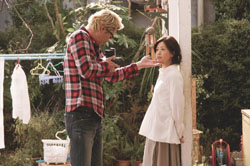Japanese film marriages are as diverse as the real things, ranging from the uncommunicative couple of Kiyoshi Kurosawa's "Tokyo Sonata" (2008) to the doting pair of the "Tsuri Baka Nisshi" ("Dairy of a Fishing Fool") series (1988-2009), though the easy-going wife of the fishing-mad salaryman hero has to put up with a lot, including hubby's drunken revels with his elderly fishing buddy/boss.
On screen, husbandly bad behavior often goes beyond the merely annoying, however, to philandering and physical violence. The behavior in question — such as the beating of the saintly heroine by her estranged husband in Yoji Yamada's "Tasogare Seibei" ("The Twilight Samurai," 2002) — is frequently presented as awful, though feudal social mores enforce wifely tolerance of it. Even so, many Japanese movie husbands get away with murder — or at least extramarital frolics.
The latter is the case with the cheating hero of Isao Yukisada's overly long but hard hitting (particularly to certain male viewers) "Kondo wa Aisaika" ("A Good Husband").



